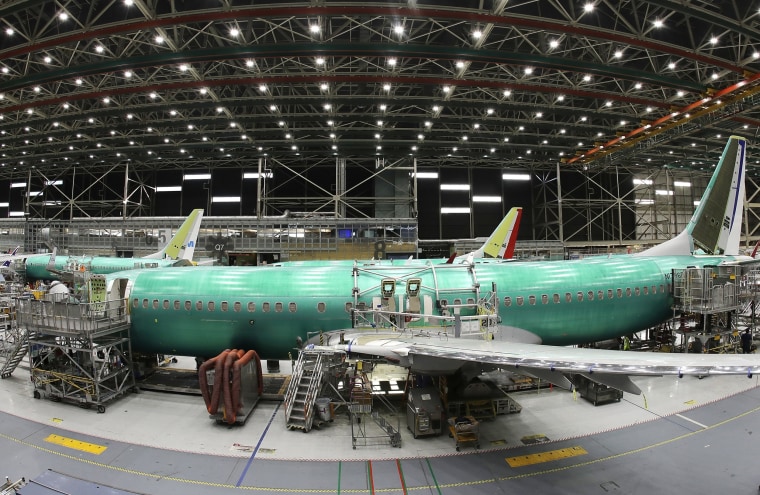Troubles continue to mount for Boeing, with low-fare Saudi Arabian airline Flyadeal announcing it was canceling an order for 737 Max 8 aircraft and would instead use Airbus as the supplier for its new single-aisle planes.
While this is the first instance of an airline publicly switching an aircraft order away from Boeing, industry analysts say it may not be the last.
“This is far from a crucial or strategic customer, but it is a sign of possible trouble ahead,” said Richard Aboulafia, vice president of analysis at aviation consulting firm the Teal Group.
Last December, Flyadeal contracted with Boeing to buy 30 Max jets, an order company executives said in March they would reevaluate pending the results of an investigation after a second fatal plane crash involving the Max occurred within a five-month span.
In the case of both accidents — the first involving a Lion Air flight last October, the second of an Ethiopian Airlines flight in March — investigators have pointed the finger at software intended to prevent the plane from stalling on ascents. The system, called MCAS, was supposed to help stabilize flight trajectory but twice sent Max jets into fatal nosedives. The fleet of Max aircraft has been grounded worldwide since March, and Boeing has slowed production of the new model while its engineers work on a fix.
The Max line was intended to replace Boeing’s existing 737 line and compete with Airbus’s A320 series. Redesigned to be more fuel efficient, some now say the changes Boeing implemented should have been more closely scrutinized by both the manufacturer and the regulators.
Aboulafia said the fact that an airline has shifted business to Boeing’s top competitor suggests a troubling turn of events for the company. “The only other talk of cancellations hasn't involved switching to the A320neo. So an outright conversion is a warning sign for Boeing,” he said. The Flyadeal purchase commitment was estimated at $5.9 billion when it was announced, although this didn’t factor in discounts manufacturers typically give carriers.
Although Airbus doesn’t have the production capacity to take much market share away from Boeing right now, analysts say, that could change. “The reason that Flyadeal canceled is they’re looking for 30 airplanes. If it were 300, I’m not sure Airbus would be able to accommodate Flyadeal,” said Harteveldt, travel industry analyst and founder of Atmosphere Research Group, a consulting company.
Harteveldt predicted that other carriers could be undergoing undisclosed negotiations with Airbus. “It’s possible other airlines that had 737 Max jets on order are also negotiating with Airbus — and I’m sure Airbus is exploring ways to expand A320 aircraft production,” he said.
It’s hard to say how much of a role consumer sentiment or pushback from flight crews might impact carriers’ willingness to keep their commitments to the Max series. In May, Barclays analysts said the results of an internal poll of more than 1,700 North American and European travelers found that almost half said they wouldn’t take a flight on a Max model for more than a year after the planes — which are now expected to remain grounded until at least September, according to Boeing — resume service. And more than half said that if they had the choice to fly on a Max or another type of aircraft, all other things being equal, they would avoid the Max.
Aboulafia cautioned against reading too much into polls like these since the reality is that, for most travelers, price is the top consideration when choosing a flight. “Most of the polls of customers so far haven't asked how much travelers would be willing to give up, in either fares or convenience, to avoid the Max, and memories are short,” he said.
Objections from airline personnel could be another issue, though. “I think that if pilots, in particular, express concern about the Max, that could sway airline strategy,” Harteveldt said. “I don’t think we’ve seen the end of 737 Max order cancellations.”
Following the grounding in March, Boeing initially said the Max would be back in the air by May, but internal and government investigators have uncovered other problems, some related to the initial fix proposed for the MCAS, that have pushed the timeline back by months. And just last week, European regulators raised concern about a previously undiscovered problem with the plane’s autopilot capability, raising the possibility of an even longer delay before the Max is airborne again.
Analysts say Boeing has a shrinking window of time to get the Max fixed and flying before it risks serious harm to its business. “It seems every time they feel they’re going to get the plane in the air, the can gets kicked down the road,” Harteveldt said. “If this plane doesn’t start flying again before Christmas, it could start to get very ugly for Boeing in terms of order cancellations.”
